"April 10, 2008
Analysis: what next after High Court ruling on BAE?
Frances Gibb, Legal Editor
When Tony Blair, as Prime Minister, approached the Attorney-General, Lord Goldsmith, QC, to argue the case for the dropping of the corruption investigation into the BAE arms deal, he insisted that it was a matter ultimately for the Government’s chief law officer. But — justifying his approach — Mr Blair said that this was the “clearest case for intervention in the public interest he had seen”.
Today, delivering one of the most damning criticisms of ministers seen in the courts, Lord Justice Moses turned those same words on their head, saying: “We agree.”
The case, he said, was a paramount instance of the need for the courts to intervene and uphold the rule of law; to stand firm in the face of a threat and say the threat should have been resisted.
In doing so, the judge, sitting with Mr Justice Sullilvan, did not mince his words. Ministers, including the Prime Minister, had advised the Attorney-General and the Director of the Serious Fraud Office — then Robert Wardle — that to continue the investigation would have grave consequences, both for the arms trade and the safety of British citizens and service personnel. In light of what he regarded as a grave risk to life, the SFO director halted the investigation.
RELATED LINKS
Dropping Saudi-BAE bribery probe 'unlawful'
His decision was challenged by the Corner House Research and Campaign Against the Arms Trade. Defending its position, the SFO argued that its director was entitled to surrender to the threat and said that the court should accept that, while a matter of “regret”, such threats were a “part of life”.
Today Lord Justice Moses and Mr Justice Sullivan unequivocally rejected that view: “so bleak a picture of the impotence of the law invites at least dismay, if not outrage”, Lord Justice Moses said. In a series of caustic comments he affirmed the importance of the courts in standing up for the law and savaged the SFO director for acting unlawfully in “buckling” to threats. Those threats, he said, had been aimed at this country’s legal system.
He said: “It is difficult to identify any integrity in the role of the courts to uphold the rule of law, if the courts are to abdicate in response to a threat from a foreign power.”
And: “We fear for the administration of justice if it can be perverted by a threat.”
He concluded: “No one, whether within this country or outside, is entitled to interfere with the course of justice.”
So what now? The SFO is considering the judgment, and could of course appeal. The Government is likely to fight tooth and nail to resist any pressure that it re-open an investigation that could damage Saudi relations — commercially, diplomatically and above all in terms of counter-terrorism intelligence.
As the judgment stands, it is likely that the SFO would have at least to revisit its decision to halt the inquiry. Whether that would mean that it came to another conclusion and reopened the whole investigation is another matter.
A fresh case would be made as to the likely damage to security and terrorism; and this time there could be no argument as to the loss of what the Government called “the largest export contract” in the past decade, the procurement of the next generation of attack aircraft — the Typhoon — because the deal is done.
As for the law officers: Lord Goldsmith has already gone from office, as has the SFO director, Robert Wardle, who will be gone in ten days' time. But the SFO’s reputation is severely damaged. Although it now has a new director, he will have a job on his hands to restore it.
As for relations between ministers and the Attorney-General, Lord Goldsmith’s legacy — not least because of BAE — was to prompt a review. His successor, Baroness Scotland of Asthal, QC, has succeeded in fighting of calls for the role to be reformed significantly. Some may now think that decision by ministers premature.
HAVE YOUR SAY
They're all guilty but what can anyone do about it?
paul, poole, gb
It is commendable that something like this involving bribery and threats from another country has been brought into the public domain. But how many times has it happened and we hear nothing of it?
What now for UK/Saudi relations? Are they far from Iraq...
Brett Sinclair, monaco,
Perverting the course of justice. As clear a case as there can be, and no-one is denying it. Surely then, Tony Blair has committed a crime.
Loosehead, Basingstoke,
This is the latest confirmation of the NORM of the widespread abuse of Parliament and constitutionality by the executive in the UK. Either there is rule of law or there is not. Where have the opposition spokespeople been? Why hasn’t there been ANY move by the mainstream Opposition in the ‘elected’ House of Commons to force compliance with the rule of law by the Executive?
Why haven THEY been the applicants for this judicial review of the highly corrupt behaviour by the Blairing regime?
This one is in the news because of the High Court action. How many thousands of similarly corrupt deals and decisions are being suppressed as we all hear about this particular one?
You say that Goldsmith is no longer in office. You mean that therefore he is exempt from liability for such an outrageous and open defiance of the rule of law! Is that acceptable? What kind of immunity must be allowed from answering on two of the most damaging violations he has committed against ethics and against constitutionality ?
How is Goldsmith able to get away like this, time after time?
Who are his de facto partners in the grand violations of the constitution?
Muhammad Haque, London, UK"
Subscribe to:
Post Comments (Atom)


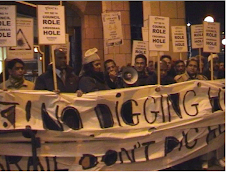
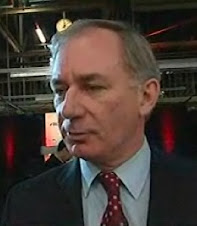









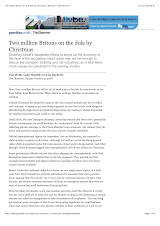
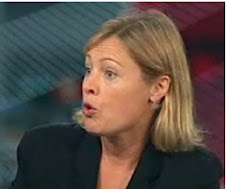




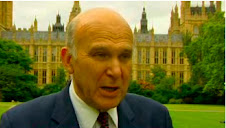
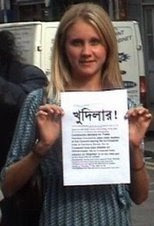
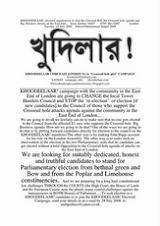

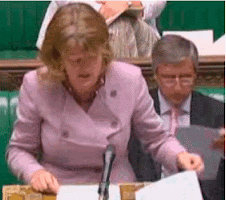




![Khoodeelaar! constitutional law campaign against the 'Crossrail Bill' [a Bill in UK Parliament]](http://2.bp.blogspot.com/_pSmwp9aFK8U/SGqe5VQwLHI/AAAAAAAABfc/MEjjMWby2dc/S226/Khoodeelaar!+try+this+logo.gif)























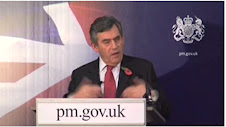


![London [Rupert Murdoched] Times, Wed. 7 May 2008](https://blogger.googleusercontent.com/img/b/R29vZ2xl/AVvXsEitiFRN6uO_MOdYMby0s7ow2zcBaewOKfl3k4QdCPcahu1IKXx6sl7Gs4aO9VrAhN8gQJvYb1a2JnODsTUsMks_LtoZVuqc64whMkMitNKVz1bijPST853uNwRNG8x2PVFl1kqRez8M3b-j/s226/1676149.jpg)















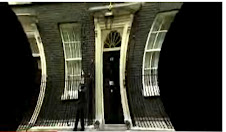

























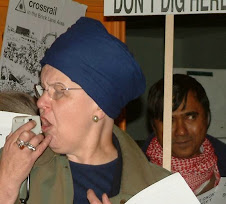




























No comments:
Post a Comment